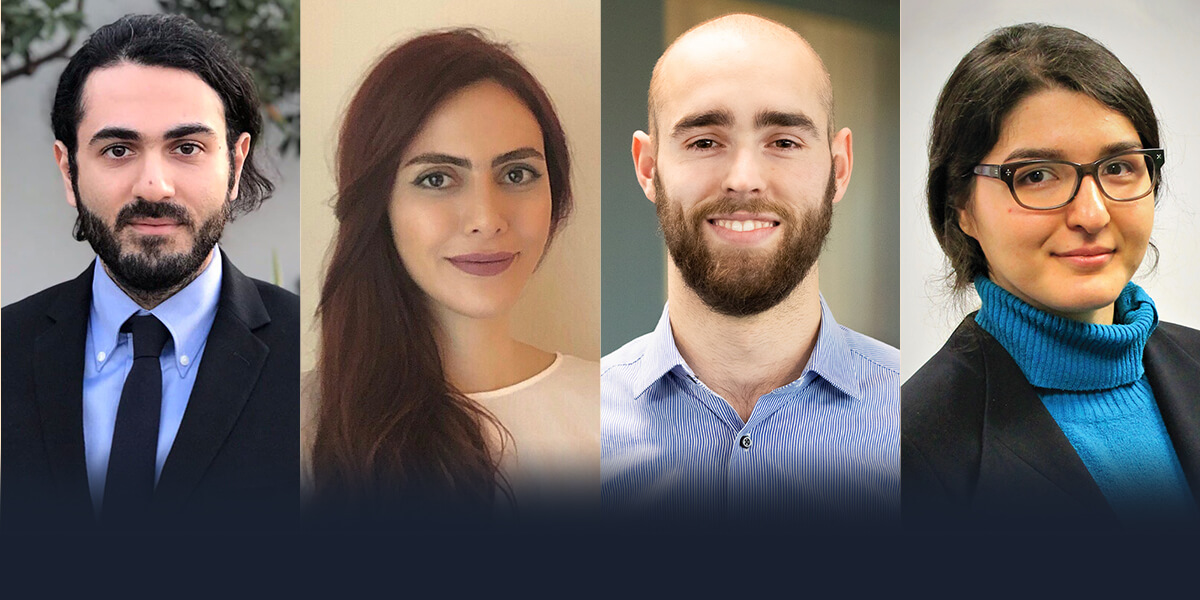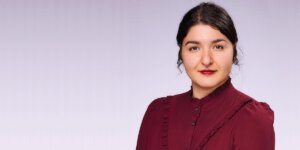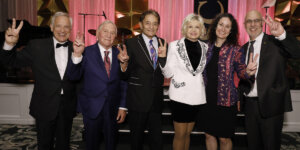
(Left to Right) Farbod Amirghasemi, Golnaz Dianat, Weston Lord and Maral Mousavi of Watershield won this year’s Maseeh Entrepreneurship Prize Competition (Photo/Madelin Lum)
As a cancer patient, Weston Lord could shower for little more than 2 minutes. Any longer and the water repellant shields protecting the hole in his chest that attached to a central venous catheter would wash away, potentially exposing the 2020 graduate of the USC Marshall School of Business to waterborne diseases.
Cancer patients who use a central venous catheter contract waterborne infections resulting on average of 24 additional days in the hospital and an increase in mortality rates by 35%, according to the Centers for Disease Control and Prevention (CDC). To protect themselves, they often fashion protective coverings out of garbage bags or struggle with shields that fall off too easily or rip their skin when removed.
Weston, who found showers mentally, physically and spiritually cleansing during his cancer treatments, thought there had to be a better way. So, he reached out to some USC Viterbi professors and students to create a pain-free moisture barrier that offers cancer patients with a central venous catheter an infection-proof, more comfortable and leisurely shower experience. The team named the product Watershield and has transformed this vision into a startup of the same name.
On April 16, Weston and his Watershield teammates, Maral Mousavi, a USC Viterbi assistant professor of biomedical engineering; Golnaz Dianat, Ph.D. Chem Eng ’19, a postdoctoral fellow in Mousavi’s lab; and Farbod Amirghasemi, a BME doctoral student, won the $50,000 grand prize at the 11th annual Maseeh Entrepreneurship Prize Competition, or MEPC, USC Viterbi’s premier business model contest. The event was held over Zoom.
“The MEPC exposed us to the critical concepts for launching a successful startup such a customer discovery and value proposition,” Weston said.
Said Mousavi: “It gave us the opportunity to interact with a diverse panel of mentors and judges and learn from their experiences.”
Dianat added that Watershield hopes to eventually adapt its device and extend its capabilities to protect people with wounds and colostomy bags. Watershield’s bioinspired water barrier is made of silicone-based polymers that adhere to skin without the use of any chemical irritants.
Fifteen teams were accepted in this year’s MEPC, which kicked-off in November. Each group received a $250 grant from USC Viterbi’s Office of Technology Innovation and Entrepreneurship to interview customers, including at virtual conferences, or for LinkedIn subscriptions.
The field was whittled down to six finalists in March. Teams competed for $50,000 in cash and more than $50,000 in free legal and business services offered by DLA Piper, Novus GC and Morrison Foerster.
The 2021 MEPC winners include:
2nd Place: LISUS Lithium wants to leverage expertise in multispectral remote sensing and artificial intelligence to change the way minerals are extracted and supplied.
3rd Place: Valence augments emotional perception of neuro-divergent people with a sensory substitution app, translating emotions to vibrations on a haptic wristband.
4th Place: Frontida Records is solving current issues of health documentation for the most vulnerable with a customizable electronic health record and documentation system specialized for NGOs and their patients in volatile, under-resourced environments.
Zūk Fitness is a workout platform to help all wheelchair users and people with mobility impairments live healthier and more fulfilling lives.
Apsy is democratizing innovation by providing fast, affordable, and highly customizable apps enabled by machine programming.
USC Viterbi Dean Yannis C. Yortsos said MEPC “has not only changed the conversation about the importance of innovation and entrepreneurship in engineering, but has resoundingly affirmed their critical importance as a key pillar of engineering education and research.”
MEPC Director Alice Liu, added that USC Viterbi and other students benefited greatly by participating in the competition.
“They’re getting a taste of the entrepreneurial mindset that equips our engineers to be successful in the innovation economy,” she said. “There are a number of skills it develops that rounds out and complements the Viterbi curriculum, including initiative and grit, flexibility and adaptability, creativity and better communication skills.”
Over five months, teams attended six workshops, including customer discovery, intellectual property, financials and storytelling, to sharpen their entrepreneurial skills. The National Science Foundation Innovation Corps (“I-Corps”) program, the nationally recognized lean startup program focused on technology commercialization, provided the curriculum.
The sessions were led by Liu, the MEPC director; Pai-Ling Yin of the Lloyd Greif Center for Entrepreneurial Studies at the USC Marshall School of Business; and Rob Schoeben, an adjunct professor of entrepreneurship at Lloyd Greif Center for Entrepreneurial Studies.
Chloe Duckworth, Valence CEO and a sophomore majoring in computational neuroscience, said she and her teammates found the workshops especially valuable.
“Through MEPC, we learned how to conduct a proper customer interview to get usable feedback and how to discover the business model that customers support,” she said. “But most importantly, we learned who to ask and where to look for resources to help us as questions arise every step of the way.”
Participants also said they profited from working with mentors.
Tooraj Helmi of Apsy credited his team’s mentor for teaching him to give an effective one-minute pitch to investors, an integral part of the fundraising process. Helmi, B.S. CS ’05, M.S. EE ’07, MBA ’12, a Ph.D. student in computer science, added that tech veteran Ray Freiwirth encouraged Apsy to standardize much of its customer acquisition and tracking so that team members know how customers learn about them, allowing Apsy to optimize sales activities.
Freiwirth, an investor with the Tech Coast Angels and founder of The Commons XR, a startup in the tech educational space, said the quality of the MEPC teams impressed him.
“The USC teams were very good,” he said. “They have a high degree of capability, and the program helped the process by which they went from being just a team to a startup.”
Founded in 2010 with a $1 million endowment from entrepreneur Fariborz Maseeh, MEPC has become one of the university’s premier business model competitions for USC Viterbi students, faculty and other would-be business builders.
Over the years, said Liu, the MEPC director, USC Viterbi students have taken increasingly more prominent roles in the competition.
“In the past, we often saw teams where the business students were effectively taking the lead CEO role,” she said. “Now, you’re seeing more and more Viterbi students stepping up to play that role. It’s wonderful to see this greater appetite to jump into the entrepreneurial hustle among our students .”
MEPC has spawned several promising companies over the past decade.
The 2020 winner, GrayMatter Robotics, hopes to leverage AI to create smart and rapidly deployable robotic assistants to automate high-mix manufacturing tasks. The 2019 victor, AIRBOND, now called Apogee Composites, has designed a more efficient and cheaper way to produce carbon fiber composite materials for the aviation and other industries. That year’s runner-up, Marlink, an all-women undergraduate team developing an underwater exploration device that allows information to be transmitted and received between AUVs and scientists, represented the United States in the Global Grand Challenges Summit finals in London. Marlink, was one of the first, if not the first, all-women undergraduate teams to compete in MEPC.
AesculaTech, the 2016 runner up, develops and manufactures a platform of temperature-responsive smart materials for use in medical devices, including the treatment of dry eye. After MEPC, AesculaTech received an invitation to Y Combinator, the famed Bay Area business incubator.
Second Spectrum, the 2013 victor, analyzes big data for insights into sport performance, such as what constitutes good defense and offense in basketball. Currently, all NBA teams receive Second Spectrum optical tracking data, which powers next-generation analytics.
Dillon Connolly, B.S. ISE ’11, of Zuk Fitness said he believes that participating in the competition has given him additional confidence and know-how to become a successful business builder.
“Having hours of discussion about our businesses with accomplished entrepreneurs who have done this before was incredibly helpful in so many ways,” said Connolly, a former record-holding member of the USC swim team who became a quadriplegic in 2014 after diving headfirst into a hidden sandbar to avoid a wave in Newport Beach. “I’m just trying to be a sponge and soak everything in that I can.”
Published on April 23rd, 2021
Last updated on April 26th, 2021











